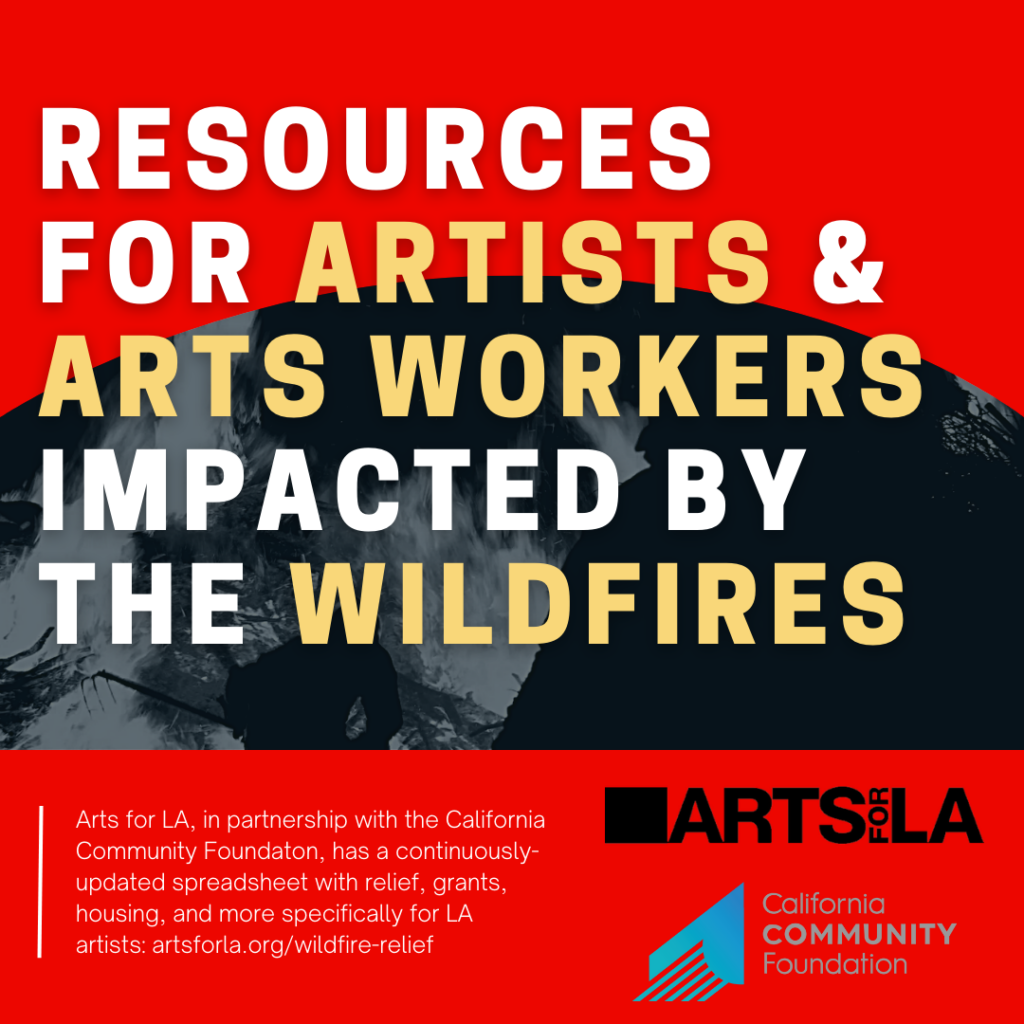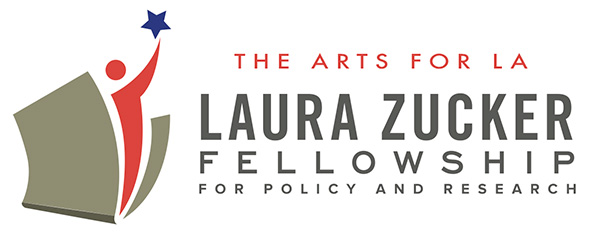
Named in honor of Laura Zucker on the occasion of her retirement from her 25-year tenure as Executive Director of the Los Angeles County Arts Commission, the Laura Zucker Fellowship for Policy and Research is the first ever fellowship for individuals to effect change at the regional level focused on arts and cultural policy development, reform, and implementation in Los Angeles County.
This bi-annual Fellowship is open to those who have a demonstrated interest in conducting research and/or crafting public policy pertaining to the arts and cultural landscape of the Los Angeles region. The 2024 report “Arts and Music in Schools” by Lindsey T. Kunisaki can be found below. If you run into any trouble downloading the file or you have questions, please contact rabilez@artsforla.org.
DOWNLOAD FULL REPORT
BENEFITS OF THE FELLOWSHIP:
- Recognition as a Laura Zucker Policy and Research Fellow.
- $6,000 stipend.
- One-on-One mentorship from Arts for LA’s Director of Policy & Advocacy.
- One-on-One mentorship with a subject matter specialist, identified by Arts for LA staff during onboarding.
- Access to Arts for LA’s resources, including, but not limited to: in-house data and expertise as well as access to strategic partners.
- Real-world experience crafting and executing an independent research project involving the collection and/ or analysis of data to inform develop, reform, and/or implement policy initiatives.
- Recognition at Arts for LA’s State of the Arts Summit and inclusion in Arts for LA’s Policy and Advocacy agenda.
GUIDELINES AND ELIGIBILITY:
- Live, work, or study in Los Angeles County.
- Recently graduated from or currently enrolled in a masters or doctoral program in Public Affairs, Public Policy, Arts Management/Administration or a related field OR have a minimum of 5 years experience working as an artist, in arts administration, arts education, public affairs, or a related field.
- Demonstrated interest in OR experience conducting research and/ or crafting public policy pertaining to the arts and culture (this may include any number of years in a college or university program, regardless of degree completion).
- Lived experience may be considered as a substitute for the qualifications listed above. Otherwise qualified applicants will be considered, as Arts for LA will pair fellows with with a mentor to guide the research process

EXPECTATIONS:
- The fellow will complete an empirical research report that includes an executive summary, literature review, methodology, results, recommendations, and limitations.
- The report will be included in Arts for LA communications, including, but not limited to: Arts for LA’s monthly newsletter, website, and social media.
- The fellow will compile and present their project to Arts for LA staff and receive recognition at Arts for LA’s State of the Arts Summit.
- Research will be used to advance Arts for LA’s policy and advocacy platform. AFLA reserves the right to review or edit content, tone, and vision at their discretion.
- The fellow will connect with ACTIVATE Delegates and elected officials.
- The fellow will be able to commit approximately 15-20 work-hours per week for a 6-month period (March-August 2024).
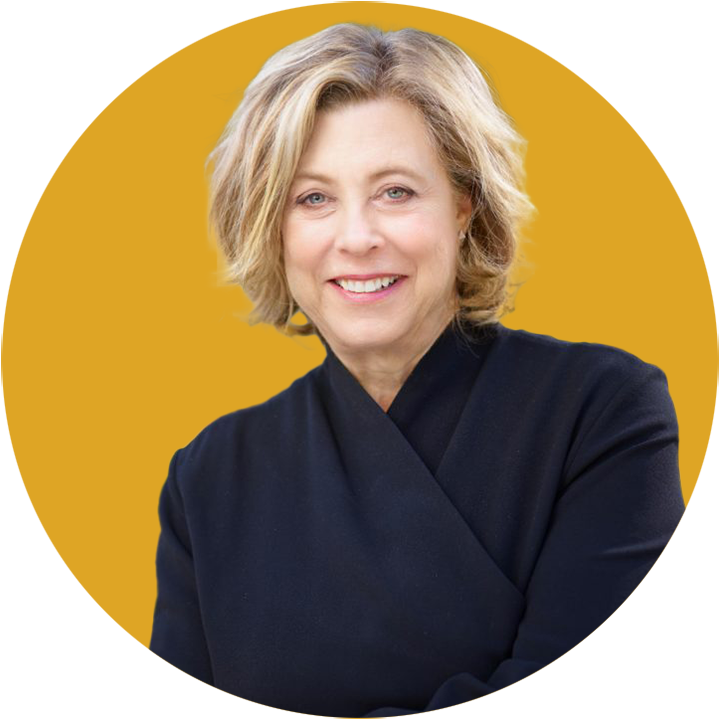
A MESSAGE FROM LAURA ZUCKER
My career has followed the trajectory of many in the field: I started as an artist, attending the Yale School of Drama as an actor, moved quickly to directing, and then found my forte in producing and arts administration. My interest in cultural policy grew organically. While running the theatre I co-founded, the Back Alley Theatre, I became chair of the Associated Theatres of LA, and was responsible for negotiating the first 99 seat theatre plan for L.A., an important early opportunity to see the effect of cultural policy in action.
Fellows
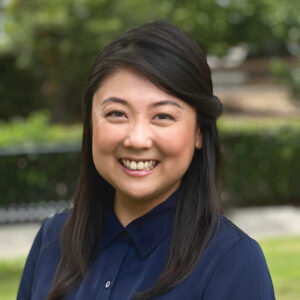
Lindsey Tomiko Kunisaki (she/her) is a researcher and evaluator exploring cultural sustainability, educational equity, and creativity development. She is the Research & Evaluation Specialist with the UCLA Visual and Performing Arts Education (VAPAE) progarm and a Ph.D. candidate in the School of Educational Studies at Claremont Graduate University. She also co-founded the Nikkei Music Reclamation Project, a multigenerational musical collective of Japanese diasporic musicians.
ABOUT THE RESEARCH
Prop 28 stands to transform arts education in California—and now raises questions about how its promise is put into action. This study asks how LA County school leaders are envisioning and witnessing the impact of Prop 28 at their schools. Bringing together data from the CA Department of Education, original surveys, and interviews with school leaders, this study will offer insights about how the momentum of Prop 28 is propelling the arts forward across the region. Check back this Fall for the full report!
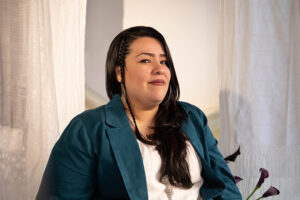
Photo by Mercedes Zapata
Erika Hirugami, MA., MAAB., is a first-generation transnational Japanese Mexican immigrant, formerly undocumented. Hirugami holds an MA in Art Business from the Sotheby’s Institute of Art, in conjunction with the Drucker School of Management and Getty Leadership Institute at Claremont Graduate University. As well as an MA in Chicanx Studies from UCLA entitled “Political Art Action: The Aesthetics of Undocumentedness.” She also holds BAs from the same university in the fields of Art History, Chicano Studies, and Mexican Studies. Hirugami is currently a teaching associate and doctoral candidate at UCLA, where she epistemologically braids the aesthetics of undocumentedness to challenge immigration policy and politics.
Hirugami is the founder and CEO of CuratorLove, Co-founder of the UNDOC+Collective, the ED at AHSC, a Professor at CBMArts and SMC, Arts for LA Fellow, NALAC NLI Fellow, CCI Catalyst, and DAICOR Fellow. As a Getty and Kress Foundation Fellow, she has developed curatorial statements at museums across Mexico and the United States. After being a Public Art Curator for the Department of Cultural Affairs in the City of Los Angeles, Hirugami became the Curatorial Director for the Ronald McDonald House Charities while leading various commercial galleries. She has curated exhibitions for multiple museums and galleries across the globe, and her written work has been published internationally. More on Erika Hirugami.
ABOUT THE RESEARCH
This report serves as witness to the undocumented labor force of the LA creative industries, an essential community within the arts sector. Today, there is a widespread lack of awareness of this segment of the population within the arts and culture community, underscoring the need for improved systems and practices to promote the inclusion and vitality of undocumented artists and arts professionals. The focus of this document is Undocreatives. The term refers to undocumented members of the creative industries (artists and arts professionals). Further key terminology is defined in the Appendices. This analysis utilizes testimonios to highlight undocreative lived experiences, the systemic challenges undocreatives face, and the support that undocreatives need from the arts sector. As the first analysis of its kind, this study acknowledges the significance of creating space for undocreatives within larger studies, dialogues, and practices surrounding cultural justice, equity, and inclusion.
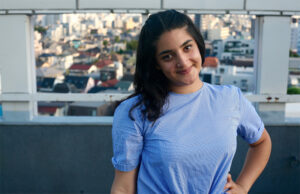
Nahal Jalali is a visual artist, writer, and strategy consultant focused on advancing social change through the arts. She is currently working on finalizing her first book on the intersection of art and public policy. The book is a collection of more than twenty accessible and compelling stories illustrating the benefits of arts and cultural programs across a variety of sectors, locations, and issue areas. Nahal is also a Senior Consultant in Deloitte’s Government and Public Services practice where she advises public and social sector clients on innovation, strategic growth, and social impact strategy.
Prior to joining Deloitte Nahal served as a Deloitte Data Analytics Fellow, a Research Assistant for Georgetown University’s Initiative on Innovation, Development, and Economics (GUI2DE), and as the Communications Specialist for a nonprofit organization managing more than fifty development projects across India and Nepal. Nahal earned her Master’s in Public Policy from Georgetown University where she wrote her graduate thesis on individual preferences for public funding of the arts in the United States. She also has a personal ceramic arts practice and is a member of the CLAY CA studio in Chinatown.
ABOUT THE RESEARCH
The arts — and artists in particular — are increasingly brought into non-arts organizations to offer fresh perspectives and incubate creative solutions to cross-sector challenges. This trend largely builds off a growing body of thought that artists possess a range of creative skills, beyond the production
of tangible artwork, that help organizations understand their challenges differently, generate innovative solutions, engage deeply and meaningfully with community, and advance social policies and outcomes. While these roles exist across different types of organizations, this study focuses specifically on municipalities. After all, in the landscape of government, it is local institutions that are often the first point of connection for most people, charged with delivering core essential services and functions, and most directly connected to daily lived experience.
At the municipal level, integrating artists into local government in a strategic capacity can manifest in many forms, including artist-in-residence (AIR) programs. These are typically part-time, or contract-based roles that position artists as strategists in various non-art departments or agencies to help infuse creative problem solving around a specific set of challenges. In addition to benefitting municipalities, these roles also support artists by creating a new and diversified set of employment opportunities and career pathways.
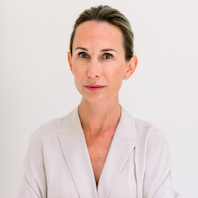 Allison Agsten is a curator and cultural organizer. As Director of The Main Museum, an institution noted for its commitment to access and community, Agsten pioneered a program centered on an artist residency program rather than a permanent collection. Previously, as Curator of Public Engagement at the Hammer Museum, she developed a precedent-setting program devoted to creating an exchange between visitors and the museum through works of art. Prior to her time at the Hammer, Agsten was Director of Communications at the Los Angeles County Museum of Art (LACMA), spearheading key institutional initiatives related to accessibility. Agsten began her career at CNN, covering the arts, entertainment, and financial news as a producer in the Los Angeles bureau.
Allison Agsten is a curator and cultural organizer. As Director of The Main Museum, an institution noted for its commitment to access and community, Agsten pioneered a program centered on an artist residency program rather than a permanent collection. Previously, as Curator of Public Engagement at the Hammer Museum, she developed a precedent-setting program devoted to creating an exchange between visitors and the museum through works of art. Prior to her time at the Hammer, Agsten was Director of Communications at the Los Angeles County Museum of Art (LACMA), spearheading key institutional initiatives related to accessibility. Agsten began her career at CNN, covering the arts, entertainment, and financial news as a producer in the Los Angeles bureau.
ABOUT THE RESEARCH
“For the last ten years, Los Angeles has been heralded as the creative capital of the world but an erupting affordability crisis threatens to diminish that status. In a survey of 763 artists conducted for this report, 89% stated that affordability of housing in Los Angeles County is a serious concern. 90% said the same of workspace affordability. When paired with data on incomes, it is clear the majority of Los Angeles area artists struggle to pay rent: 57% reported incomes of $50,000 or less a year. With median rents in Los Angeles at $1,369 for a one-bedroom as of August 2019, these artists are “cost burdened;” anyone who pays in excess of 30% of their income in rent, according to the Department of Housing and Urban Development. Those who are cost burdened often have difficulty paying for basic necessities like food, clothing, transportation, and healthcare. Worse still, the rate of present day and recent homelessness amongst artists surveyed is more than three times that of the current rate of homelessness in Los Angeles County…”
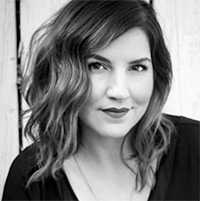 ADDY GONZALEZ RENTERIA received her bachelor’s degree in Art History from UCLA and graduated with a Masters degree in Arts Administration from Drexel University. Her master thesis focused on the feasibility of creating a cultural development plan for the San Fernando Valley and while interning at the Museum of Latin American Art she co-founded 11:11 A Creative Collective, a San Fernando Valley Art non-profit organization which is still active and growing. To date, 11:11 A Creative Collective has programmed 125 square miles of the San Fernando Valley with art festivals, public art, exhibitions, and workshops. Addy is also familiar with research on land use, governmental regulations and drafting as she worked for an architectural firm for 14 years. She worked for the City of Los Angeles Council District 7 as its Cultural Development consultant and developed a comprehensive public art development plan specific to that neighborhood. She has 10 years experience producing art exhibits, public & private events and community development through the arts. Addy was previously a Cultural Policy Fellow in the 2015-16 cohort of Arts for LA’s ACTIVATE Program and has received certificates of recognition from Los Angeles City Council as a Latina woman in the arts as well as one for her cultural work in the San Fernando Valley from the Los Angeles Public Works Department. She is currently the Project Director for Now Art, the leading public art organization in Los Angeles whose focus is to bring a stronger public art presence to Los Angeles with emotionally evocative, culturally attuned and meaningful works. Her experience in the arts and non-profit world, combined with her architectural background and free-lancing consulting work has given her invaluable insight as to what it takes to turn ideas into fully realized and executable projects. She is passionate about the arts, cultural policy/planning, sustainable design, architecture, and creating spaces and experiences that have a long-lasting positive impact in our communities.
ADDY GONZALEZ RENTERIA received her bachelor’s degree in Art History from UCLA and graduated with a Masters degree in Arts Administration from Drexel University. Her master thesis focused on the feasibility of creating a cultural development plan for the San Fernando Valley and while interning at the Museum of Latin American Art she co-founded 11:11 A Creative Collective, a San Fernando Valley Art non-profit organization which is still active and growing. To date, 11:11 A Creative Collective has programmed 125 square miles of the San Fernando Valley with art festivals, public art, exhibitions, and workshops. Addy is also familiar with research on land use, governmental regulations and drafting as she worked for an architectural firm for 14 years. She worked for the City of Los Angeles Council District 7 as its Cultural Development consultant and developed a comprehensive public art development plan specific to that neighborhood. She has 10 years experience producing art exhibits, public & private events and community development through the arts. Addy was previously a Cultural Policy Fellow in the 2015-16 cohort of Arts for LA’s ACTIVATE Program and has received certificates of recognition from Los Angeles City Council as a Latina woman in the arts as well as one for her cultural work in the San Fernando Valley from the Los Angeles Public Works Department. She is currently the Project Director for Now Art, the leading public art organization in Los Angeles whose focus is to bring a stronger public art presence to Los Angeles with emotionally evocative, culturally attuned and meaningful works. Her experience in the arts and non-profit world, combined with her architectural background and free-lancing consulting work has given her invaluable insight as to what it takes to turn ideas into fully realized and executable projects. She is passionate about the arts, cultural policy/planning, sustainable design, architecture, and creating spaces and experiences that have a long-lasting positive impact in our communities.
ABOUT THE RESEARCH
“PRESERVING ARTS & CULTURAL RESOURCES THROUGH PLANNING MECHANISMS: DEFINITIONS, ENVIRONMENTAL SCAN, AND PRELIMINARY AVENUES OF EXPLORATION.”
As our cities move into the 21st-century, change is inevitable and happening fast. While the demand for development is real, the growth and reconfiguration of our cities should not threaten the arts and cultural resources that preserve and create a sense of place, identity, and belonging. Instead, growing cities should take greater care in creating environments where their arts and cultural resources thrive and evolve, paving the way for further benefits such as economic prosperity and healthy communities.
This report investigates ways for preserving arts and cultural resources via various planning tools while acknowledging the realities of development. Specifically, the question of feasibility for expanding and/ or redefining the arts and cultural component in Environmental Impact Reports (EIRs) is considered, as well as the efficacy of two additional planning tools: Cultural Districts and Arts Overlay Zones that have previously been used as mechanisms for preserving arts and cultural resources. Lastly, the benefits of creating Affordable Spaces for the Arts is examined as a way to preserve arts and cultural resources.
Through these investigations, this report aims to highlight the benefits of a more holistic approach to planning that includes the arts and culture throughout each of the various planning stages in order to create a more comprehensive, culturally informed approach to the development of our 21st-century cities.
Special thanks to Laura Zucker for her unwavering support of arts and culture in LA and across the world, Abril Iñiguez-Rivas for designing and managing the inaugural Laura Zucker Fellowship, Jessica Cusick for her mentorship and guidance, and to Sofia Klatzker for her years of leadership and commitment to cultural research and policy.
